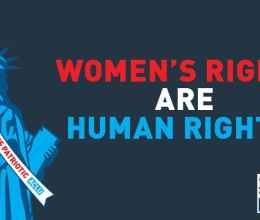SAN DIEGO – Southwestern College administrators approved free speech procedures that generally align with state and federal law, after a years-long campaign by First Amendment advocates including the San Diego ACLU and the Foundation for Individual Rights in Education.
Adopted earlier this month, the new “Freedom of Expression Procedure” declares that “students, faculty and staff are free to exercise the rights to assemble and engage in expressive activity” subject only to regulations to prevent problems such as safety hazards, substantial disruption, and “riotous conduct,” and to coordinate campus activities.
“This has been a drawn-out process,” said David Blair-Loy, legal director of the ACLU of San Diego & Imperial Counties. “We are glad the current college administration has recognized the importance of free speech on campus.”
Under the threat of potential litigation, Southwestern College has worked since 2009 to revise its free expression policies, which previously designated a miniscule “Free Speech Plaza” on one patio while declaring the rest of the 156-acre campus out of bounds for free speech. Though the new policy is perhaps not ideal, for example by requiring a permit application to be submitted at least seven working days before a proposed parade or march, overall the policy demonstrates a marked improvement and acknowledgement that expressive activities and an open exchange of ideas should be celebrated by the college.
“While problems remain, the new policy is a useful step forward and a significant improvement over the previous restrictions on campus speech,” said Will Creeley, Director of Legal and Public Advocacy of the Foundation for Individual Rights in Education (FIRE). “There are still several troubling provisions that we will continue to monitor, but we are optimistic that students, faculty and staff will help show the way and demonstrate that a campus where free expression flourishes is more robust, intellectually and culturally stimulating, and healthier in every regard.”
Since November 2009, the San Diego ACLU and FIRE sought to convince SWC to fix constitutional flaws in its so-called “Free Expression” policy. The policy had illegally restricted speech, expression and assembly by students, faculty and staff. The ACLU became involved in 2009 when SWC’s then-president ordered students to disperse a peaceful rally, and retaliated against faculty who had participated.
Southwestern College Finally Meets Free Expression Threshold
Related Issues
Related content
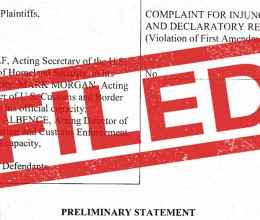
Journalists Sue Federal Government to Defend Free Press in ACLU...
November 21, 2019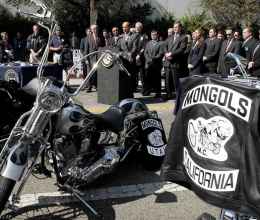
The Justice Department Wants to Strip the Mongols Biker Club of Its...
February 25, 2019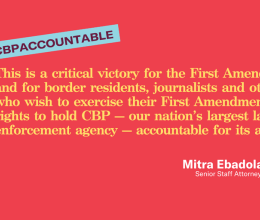
ACLU Statement on Ninth Circuit Decision Affirming First Amendment...
August 14, 2018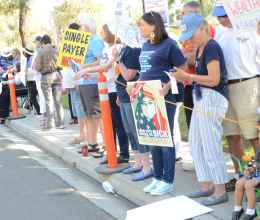
ACLU: CA Law Used to Cite Drivers Who Honk Their Horns During...
June 12, 2018ACLU Wins Suit Over Individuals’ Right to Protest and Monitor...
February 13, 2018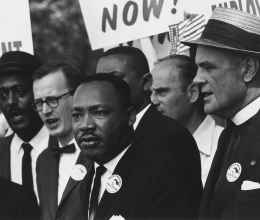
ACLU Condemns El Cajon’s ‘Food Sharing’ Ban and Subsequent Arrests...
January 15, 2018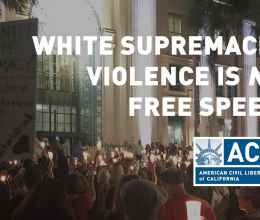
ACLU of California Statement: White Supremacist Violence is not...
August 16, 2017ACLU: City of Vista Must Permit Peaceful Protests Outside Rep....
June 1, 2017